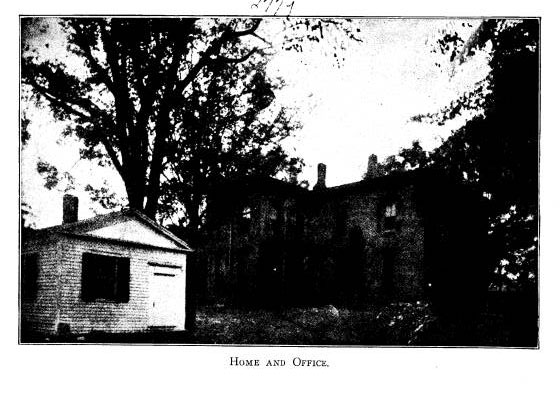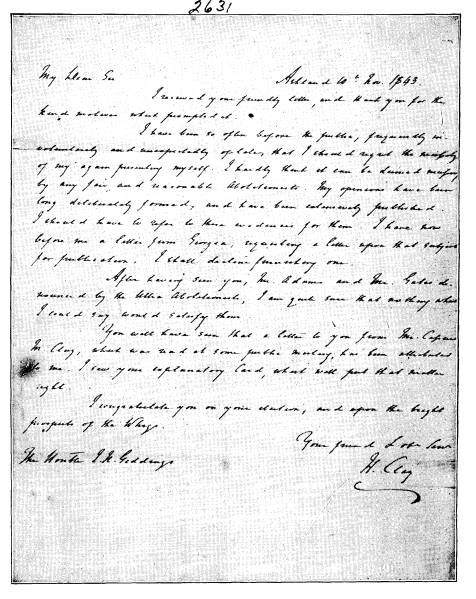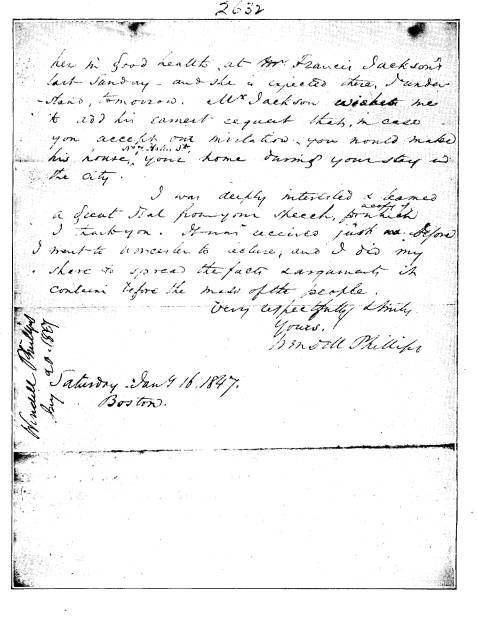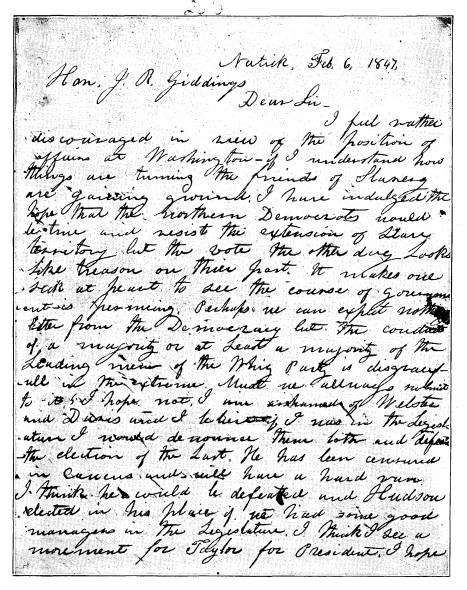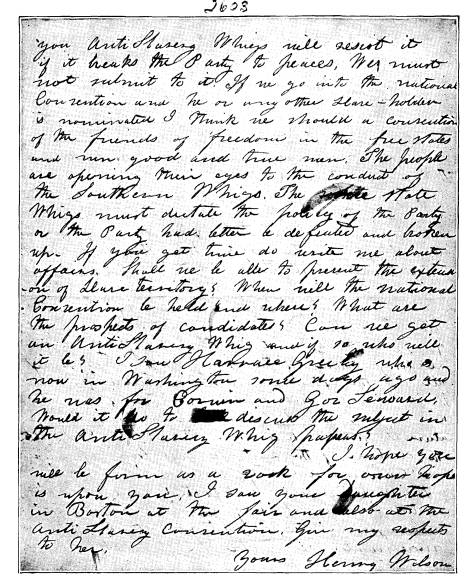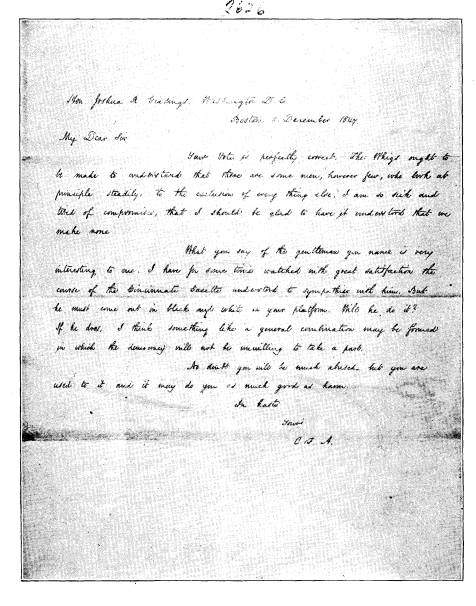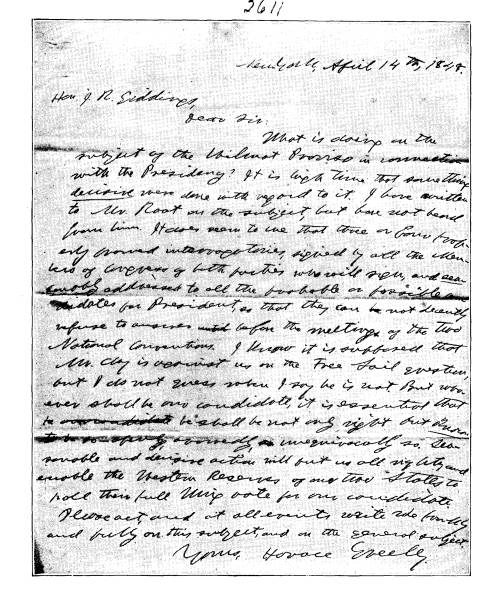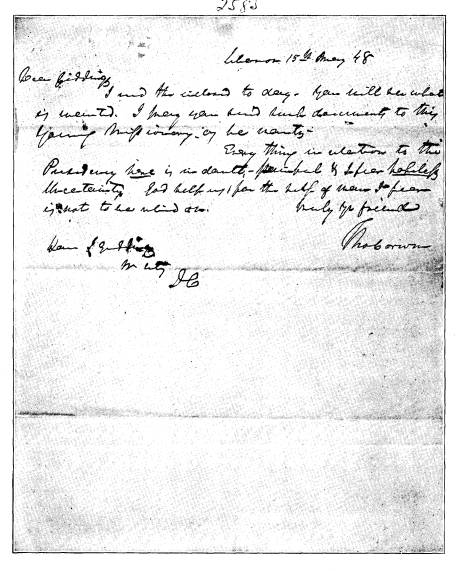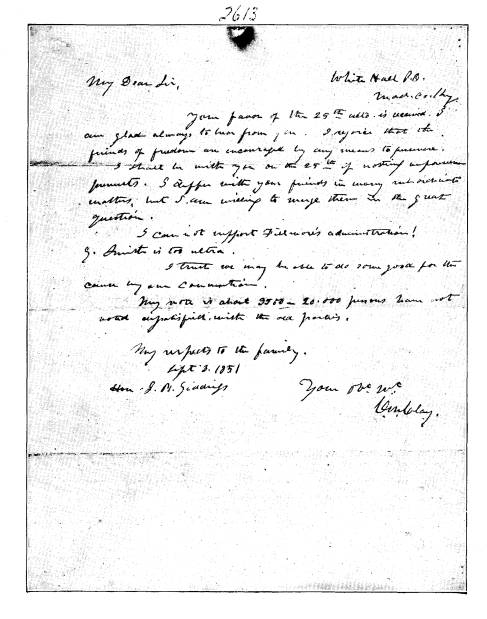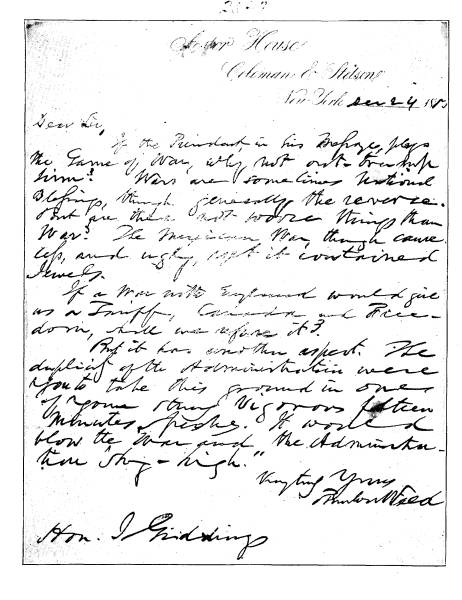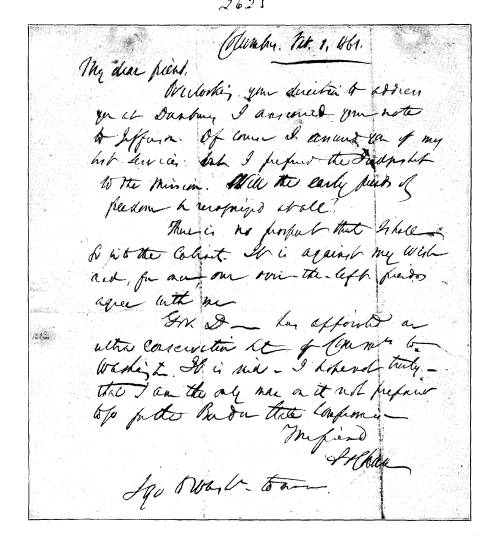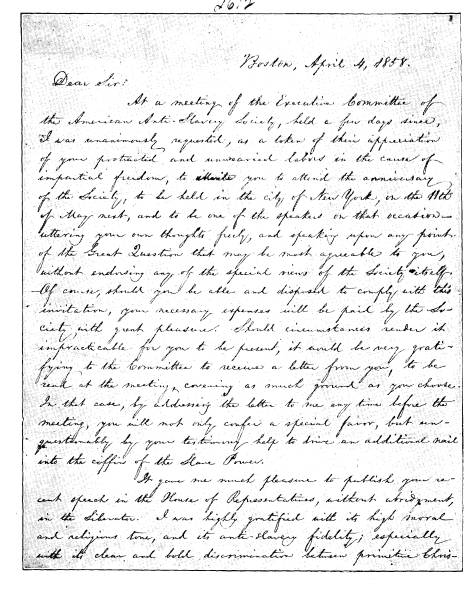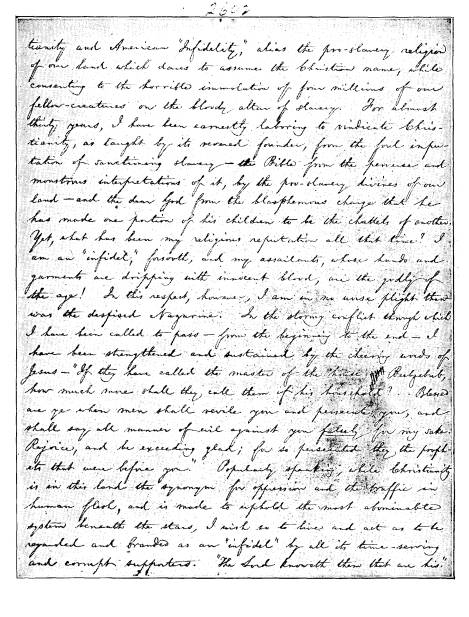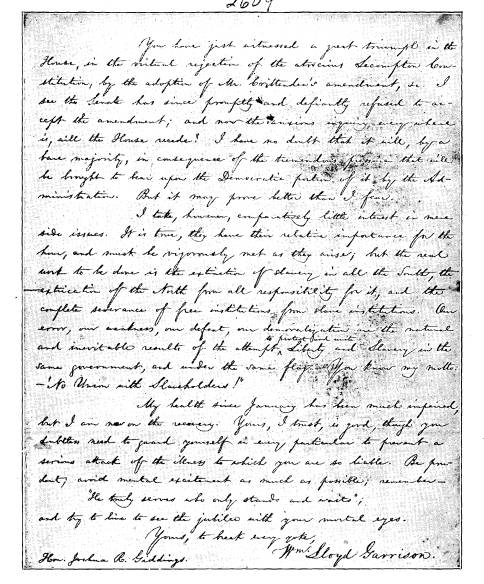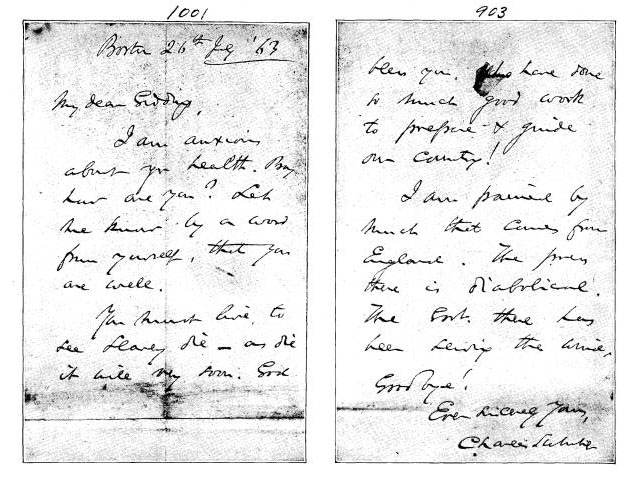Ohio History Journal
- 1
- 2
- 3
- 4
- 5
- 6
- 7
- 8
- 9
- 10
- 11
- 12
- 13
- 14
- 15
- 16
- 17
- 18
- 19
- 20
- 21
- 22
- 23
- 24
- 25
- 26
- 27
- 28
- 29
- 30
- 31
- 32
- 33
- 34
- 35
- 36
- 37
- 38
- 39
- 40
- 41
- 42
- 43
- 44
- 45
- 46
- 47
OHIO
Archaeological and Historical
PUBLICATIONS
JOSHUA REED
GIDDINGS
A CHAMPION OF
POLITICAL FREEDOM.
BY BYRON R. LONG.
There never was a time perhaps when
there was less need
for furnishing material for readers than
just now. The world-
war has been productive of thot and
action such as has enlisted
thousands of good writers who are
keeping record of incidents
and are setting down impressions which
are moving the souls
of men as profoundly as any that human
life has experienced.
The excuse for this wrting differs
little from that given for
any of similar nature. Namely, that men
are apt to forget the
causes which lie beneath the structure
of national life and the
circumstances that have led to the
struggle waged in defence
of and in perpetuation of that life.
Furthermore, there has been
no more fitting time to recall the
incidents of seventy-five years
ago that led up to the conflict which
resulted in the abolition of
slavery as the chief feature of the
achievement of a nation in a
generation.
The recollection of events of that time
bring before the
mind's-eye the actors on the stage in
those wonderful, decisive
days. The question of human slavery was
the burning question
with Americans and it received attention
from many angles of
vision. Strong men withstood one another
in the arena of debate
for and against this evil that struck at
the vitals, both of the en-
slaved and the enslavers.
1.
2 Ohio Arch. and Hist. Society Publications.
Horace Greeley in the valuable
contribution made by him to
this study under the title of
"Slavery Before the Revolution"
says:
"The first man who ever imbibed or
conceived the fatal delusion
that it was more advantageous to him or
to any human being to
procure whatever his necessities or his
appetites required by address
and scheming than by honest work-by the
unrequited rather than the
fairly and faithfully recompensed toil
of his fellow creature-was in
essence and in heart, a slave holder and
only waited opportunity to
become one in deed and in practice. And
this single truth operating
upon the infinite variety of human
capacity and culture suffices to
account for the universality of slave-holding
in the anti-Christian age,
for its tenacity of life, and for the
extreme difficulty of even its partial
eradication. The ancients, while they
apprehended perhaps adequately
the bitterness of bondage which many of
them had experienced do not
seem to have perceived so vividly the
corresponding evil of slave-hold-
ing. They saw the end of the chain which
encircled the ankles of the
bond-man, they do not seem to have so
clearly perceived that the other
lay heavily across the throat of his
sleeping master. They do not seem
to have perceived that the slave-holding
relation effected an equal dis-
count on the value of the master as the
slave-held relation affected on
the slave."
This observation of Mr. Greeley so full
of suggested wisdom
did not get its due measure of just and
considerate credence even
at that late date in the history of the
monstrous traffic. So
meager, in fact, was the feeling about
it that even when the eman-
cipation proclamation got utterance and
later, when its substance
got woven as a constituent part into the
foundation document of
our national government, slavery had not
been driven from our
midst save in a nominal way.
Sixty years have gone by and we are
troubled with it yet.
The seed of human slavery was a strong
one. The terrible war
that wages on the borders of France and
Belgium in this year
1918 is being waged because this weed
still grows in human gar-
dens. Human bondage still lives-a mighty
force in the world,
which tho no longer politically
legalized as in a former age is
still a terrible ghost, begetting fear.
History repeats itself, but usually on a
bigger scale. When
one analyzes the epic making events in
the story of human prog-
ress it is discovered that lying back of
these events are motives
Joshua Reed Giddings. 3
and forces and struggles that are born
of the desire in man to
be free. Freedom is the natural cry of
the human wherever
he asserts himself. In course of human
progress the individual
finds himself a part of the community
motived by the same spirit,
and movement under the spell of this
spirit brings the dawn of
a day when the larger conception of
freedom and liberty pre-
vails. This desire for freedom is for
others as well as for one-
self. It becomes an atmosphere which all
breathe. In this sense
of freedom human relations come to
occupy a large place and
beget larger but modified activities
which the mere thot of one's
own interest fails to contemplate. When
freedom is considered
in this light it appears different from
what it does when one
thinks of himself as a solitary actor on
the stage of endeavor
and a solitary beneficiary of the
world's goods.
The struggle for American independence
and the struggle
for the enlargement and perpetuation of
that independence are
instances of the expanding comprehensive
character of the thot
and reach of freedom which the new world
had come to enter-
tain. Not only must this new land be a
home for one race with
freedom's right; but for all races
residing within its borders.
Political and religious liberty must be
a birthright of all. The
soil of America allows no other. The
sacrifice of blood and toil
and property could be made for this and
nothing short of this.
Freedom is a very big term, it is in
fact that last term of the
moral and spiritual ascending series. In
spiritual phrasing the
greatest of all teachers taught that
freedom comes only with the
knowledge of the truth. "Ye shall
know the truth and the truth
will make you free." Such truth has
to do with relations of
life rather than with axioms.
Our country has gone to war again and
the big thot in the
mind of the nation on entering the war
is that of freedom for
all men. Millions of men have been in
training in the con-
flict across the ocean and the whole
purpose of this training
has been that these men should be
equipped to do the utmost
that liberty may prevail everywhere,
until the smallest nation
without army or navy or battlements or
any of the long estab-
lished methods of warfare may be
perfectly safe to carry on the
arts of peace. Our fathers of the
Revolution and of the Rebellion
4 Ohio Arch. and Hist. Society Publications.
were not able to see the outcome of the
struggles in which they
took part, but the same principle was
operating then as is operat-
ing now. One of our failures is that we
do not live and act
with sufficient prophetic faith and
insight. Most of us work for
immediate results and feel that when
these are reached that we
have done our bit, but no one has done
his best till he has wrought
with prophetic outlook on his deed and
the fruit of it. We
all remember Browning's words:
"Grow old along with me,
The best is yet to be-
The last of life-for which the first was
made.
Our times are in his hand
Who said the whole I planned.
Trust God, see all nor be afraid."
This should be one's faith even unto
death. By this route
alone can big results come either here
or there. By this way
alone we shall know the truth and by it
be made free and dele-
gated with freeing power. Our nation
today seems to be hunger-
ing not only for larger freedom for
itself but for power and
grace to help others secure freedom for
themselves that in the
end the whole world may be free.
It is fitting that at a time like this,
we revive a little Ohio
history that was made by a few men and
women stirred with a
passion to do all they could to bring
about the emancipation of
a race hitherto the victim of political
bondage.
Into the American family quarrel of the
first half of the
nineteenth century stepped a number of
men who proved
big men for their day and who in the
performance of their duties
created a fund of indebtedness which the
generations since have
not been able to pay, and only as the
generation now active plays
its part well, will it honor the heroic
men of these tragic years
of struggle in halls of congress and on
the battle-fields of the
Southland.
It is not the purpose of this paper to
give all the details
of a life story, altho such a story
would be a most impressive one
and has never been told in the pages of
this periodical.
A brief reveiw of this life is all that
will be attempted, the
Joshua Reed Giddings. 5
main purpose being to present some of
his cooperation and
correspondence with the noted men of his
time.
To say of the period mentioned that it
witnessed the growth
of men who were giants is not
exaggerating. There were giant
tasks to be performed and it took giant
men to perform them.
Joshua R. Giddings was one of the
sterling, rough-hewn char-
acters who came to America in the period
of her greatest crisis
when the staunchness of her foundation
was tested to the utter-
most. A writer in the Cincinnati
Enquirer some time in 1905
said of Joshua R. Giddings that "No
man had as much to do
with the precipitation of the Civil War
as had he. Due to the
fact that no other man so big and
capable felt that the only means
of wiping out the curse of slavery
depended upon the strong arm
of government enlisted in war. He was
opposed to the Mexican
War because he felt that it was waged in
the interest of slavery.
He was in favor of the Civil War because
he saw in it the only
means for abolishing slavery, and when
once he had set his hand
to the plow there was no turning back
until the mighty task was
completed."
Two hundred years before J. R. Giddings
reached the zenith
of his fame his ancestors emigrated from
England, settling in
the state of Massachusetts. Seventy-five
years later his great-
grandfather removed to Connecticut; near
the close of the eigh-
teenth century his father left
Connecticut, expecting to settle in
Wyoming Valley, but not being pleased
with the surroundings,
he took his family to a more congenial
spot in the state of Penn-
sylvania. At Athens in this state Joshua
was born. In the same
year the family removed to Canandaigua
County. Here they
remained till the son was eleven years
of age, when they moved
further westward and took up residence
in Ashtabula County,
Ohio.
At that time the country was in a
wilderness state. Hard
and continuous labor was necessary to
put it in habitable shape,
such as made possible any comforts of
civilized life. Indians
were close neighbors, and wild beasts
were on every hand. Very
few white people had as yet found their
way so far westward.
It was an experience calculated to
toughen the fiber of body
and mind. It was to the culture that
came in this form that
Joshua Reed Giddings. 7
could be credited the courage and vigor
of Mr. Giddings in the
trying times when he was compelled to
take a stalwart stand
against the foes of righteousness and
truth.
The father had made rather large
purchases of land, but de-
fective titles resulted in his losing
much of it and thus he was
made to suffer the burdens and
inconveniences of poverty.
When the boy was seventeen years of age
he had part in the
defensive military program against the
British and Indians brot
about by the inauguration of the War of
1812. The
father had
fought in the battles of the Revolution
and therefore placed no
hindrance in the way of his son taking
part in the later conflict.
He was under age but he had enlisted and
had been accepted,
and continued in the line until relieved
by the coming of the regu-
lar troops. He had part in the first
battle of the war fought on
the 29th of September, 1812. The
following clipping from the
Cleveland Press makes reference to this
incident in a way that
begets considerable interest. This
clipping has been pasted in
the back part of the volume of biography
on the shelf in the Ohio
State Library:
"During the war of 1812, General
Hull sent a volunteer company
to protect the inhabitants and property
on the Marblehead peninsula,
a dozen miles east of Port Clinton.
Indians who were concealed and who
were in league with the British,
attacked the party, which sought safety
in a log house. Here the patriots
defended themselves for nearly three
days, when unexpected relief came.
"Of the entire company only
thirty-seven escaped, and the bodies
of the slain, it is said, remained for
over two years in the hut before
they were given burial.
"The few survivors pledged
themselves, if alive, on the fiftieth
anniversary of this terrible slaughter,
to meet on that occasion at the
exact spot where the conflict took
place. Giddings was nineteen years
of age at that time. Subsequently he
became a distinguished citizen
and was loved by that entire portion of
the state which sent him to
Congress. He electrified Washington and
was eminent in the public eye.
Still, as a soldier he did not forget
his promise to his comrades. On
the twenty-ninth day of September, 1862,
just a half century after, the
grey-haired veteran, true to his
promise, returned to the place where so
many of his comrades had fallen by his
side in battle.
"But he discovered that in the
passing of time, one by one, the
thirty-seven survivors had died. And so
he stood alone of them all
on the hallowed spot.
8 Ohio Arch. and Hist. Society Publications.
"Feeling it a sacred duty, in
memory of these men, the eminent
soldier-statesman erected a stone,
inscribing thereon the names of those
who fought and those who afterward died.
This stone with its records
still stands near Fox's Dock, but a mile
or a little more from historic
Johnson's Island, made famous later. The
spot is now named 'Meadow-
brook'. On the stone, the names
appearing in prominence, are Daniel
Mingus, Alexander Mason, and M. Simmons.
These men were officers.
The stone facings are covered with the
names of the men who fought in
the battle.
"Two years later Mr. Giddings
himself died, and in turn his fel-
low-citizens of Ashtabula County erected
to his memory the beautiful
monument at Jefferson.
"The conflict on Marblehead
peninsula is said to have been the
first trial at arms in the war of 1812
on Ohio soil."
Joshua R. Giddings came to a time that
needed the prophetic
insight and outlook. If any man had the
prophetic vision, Gid-
dings had it. His contemporaries came to
recognize this fact
and to honor and respect him as a
discerner of men's thots and
of the outcome of national policies
persisted in.
No one can read the history of those
times in the light of
present-day knowledge and not be
convinced that this man was
sent on a mission of special
significance to his and all future
times.
Thirteen years before Abraham Lincoln
proclaimed emanci-
pation of the slaves of the South,
Joshua R. Giddings uttered the
following words in the House of
Representatives:
"When the contest shall come; when
the thunders roll and the
lightnings flash; when the slaves of the
South shall rise in the spirit
of Freedom, actuated by the
soul-stirring emotion that they are men,
destined to immortality, entitled to the
rights which God bestowed
upon them; when the masters shall turn
pale and tremble; when their
dwellings shall smoke and dismay sit on
each countenance; Sir, I do not
say, we will laugh at your calamity, and
mock when your fear cometh, but
I do say that the lovers of our race
will then stand forth and exert the
legitimate powers of this Government of
freedom. We shall then have
constitutional power to act for the good
of our country, and to do
justice to the slave. We will then
strike off the shackles from his
limbs. The Government will then have
power to act between slavery
and freedom; and it can best make peace
by giving liberty to the slave.
And let me tell you, Mr. Speaker, that
time hastens; the President*
is exerting a power that will hurry it
on; and I shall hail it as the
*Millard Fillmore.
Joshua Reed Giddings. 9
approaching dawn of that Millennium
which I know must come upon
the earth."
A recent writer in the Sociological
Journal recalls a bit of
history relating to that time and the
forces that had to be met
before progress could be made in the
direction of universal free-
dom. He goes on to declare that "In
the Virginia constitutional
convention of 1829, the North
Carolina convention of 1835, and
the South Carolina discussion of
nullification during the same
period, the abler men of the South
definitely abandoned the doc-
trine of democracy." "John
Marshall, John Randolph, Judge
Gaston of North Carolina, and Calhoun
and McDuffie of South
Carolina, were perhaps the best
spokesmen of the political group
which led this reaction. Webster and
Chancellor Kent reflected a
similar faith in New England and New
York."
The philosophy of this group of
anti-democratic politicians
gets the following interpretation by
this same writer, and since
it is so brief and yet so comprehensive
I take the liberty to quote
further:
"The problem of the South was so to
state the common belief that
people would settle down to a quiet
acceptation of slavery and a stratified
social and economic organization, that
poor men, even when they were
in the majority, would be contented, and
that insurrection on the part
of slaves would be easily suppressed. To
do this slavery must be shown
to be a good thing of itself and the
results of the slave traffic highly
beneficial to society. Heavy work must
be done. Who could better do
it than the negro? Someone must guide
and manage public affairs.
Who could do that so well as the master
of the great plantations?
If the slave did the rough work and the
master managed the state,
common men with farms and shops would
probably vote and fight in the
event of war. In return for the
privilege of running the state the
master might be induced to meet the main
burden of taxation."
It was necessary that this doctrine get
an establishment and
to do it the best brains of the South
must be employed. If one
cares to acquaint himself with the
arguments setting forth the
civilizing (?) influence of slavery he
can find the substance of
it in a book still extant, entitled
"Pro-Slavery Argument". This
volume contains Harper's Memoirs of
Slavery, Hammond's Let-
ter on Slavery, Simm's Morals of
Slavery and President Dew's
Argument in Defense of Slavery.
10 Ohio Arch. and Hist. Society Publications.
To read these arguments today sets one
to wondering how
it was possible for sane minds to
operate so insanely. As the
writer already quoted says, "The
teachings of the great Jefferson
were dismissed with the contemptuous
remark: 'Glittering fal-
lacies' ".
President Dew at the head of William and
Mary College,
one of the most learned men of the
Southland, was during the
years from 1825 to 1836, the
period of his professorship in the
college, and just preceding his
elevation to the presidency, lec-
turing to large classes of students on
the subject of political and
social science. By this means so
generously afforded him he was
planting the seeds of what we would now
call Prussianism, for
he had spent many years in Germany
imbibing the teachings
which now, after nearly a hundred years,
have fruited in the
tragedy of the European continent. It
seems that we are still
fighting the battles that supplement the
ones fought in our own
Civil War that genuine democracy may
have its way in the world.
The writer of this article very early in
life was permitted
to read and make notation on President
Dew's "Digest of the
Laws, Customs, Manners and Institutions
of Ancient and Mod-
ern Nations," but little did he
suspect that the man who prepared
that Digest was afflicted with the
disease of Prussianism. Only
in later years did he come to know the
truth about the bias of
his mind, that could see slavery as an
authorized Christian insti-
tution.
The writer in the journal already
quoted, says, "Few greater
blows have ever struck at democracy in
the United States than
this argument of an able and trusted
teacher and scientist."
In Harper's Memoirs on Slavery are found
these words:
"The exclusive owners of property
ever have been, ever will, and
perhaps ever ought to be the virtual
owners of mankind. * * * It
is the order of nature and of God that
the being of superior faculties
and knowledge, and therefore of superior
power, should control and
dispose of those who are inferior. It is
as much in the order of nature
that men should enslave each other as
that animals should prey upon
each other."
It was this school of political
philosophy composed of the
great majority of the ablest men of the
South that had gained
Joshua Reed Giddings. 11
control not only in the southern portion
of our country but who
had driven a mighty wedge in the
Northern area that Mr. Gid-
dings had to meet when the people of the
Western Reserve called
him to represent them in the halls of
Congress. Long before he
came to his place in Congress a
resolution which had been origin-
ally suggested by Mr. Pinckney of South
Carolina and later in-
troduced by Charles G. Atherton of New
Hampshire establish-
ing a rule known as the
"Twenty-first" or the "Atherton Gag",
whereby all petitions relating to the
subject of slavery were denied
any hearing or consideration beyond the
privilege of being laid
on the table.
John Quincy Adams had never failed to
denounce these pro-
ceedings-he spoke of them as an outrage
upon Northern free-
men and Northern rights.
When Mr. Giddings came to represent Ohio
and the West-
ern Reserve Section he took the same
stand but with greater
vehemence and thus there was established
a life-long friendship
with the "Old-Man Eloquent" of
Massachusetts and they became
a battle-team of great power. Because of
Mr. Giddings' force-
ful attitude in opposition to this phase
of procedure he became
the almost sole medium thru whom
petitions from the North
found their introduction into Congress.
Especially was this true
with regard to the question of the
abolition of slavery in the Dis-
trict of Columbia. From the beginning he
was marked as an
Abolitionist but the history of those
days shows that he was so
only in the sense in which Jefferson
was. Thru all the contro-
versy he refused to be charged with any
responsibility for agitat-
ing interference with slavery in the
states where it already ex-
isted. When the war came he was a loyal
supporter of the cause
of the army of the North in its struggle
for the perpetuity of the
national government with the feeling of
assurance that when it
was all over, slavery would no longer
have an abiding place in the
United States.
Giddings came as a re-inforcement to the
cause of Freedom
as the North had defined it and had
struggled for it. He believed
in the Jeffersonian doctrine that all
men are born free and equal.
His first attempts were scorned by the
Southern men and lightly
esteemed by many in the North, but in a
very short time his pow-
12 Ohio Arch. and Hist.
Society Publications.
erful personality began to burn its way
into the consciousness of
the legislators with whom he was brot in
touch and that of the
country at large both North and South.
His attitude was the
same as that of Garrison who said in
substance: "I will take no
backward step, I will not equivocate, I
will be heard," and it was
because of this heroic stand, not only
on account of his physical
courage but because of intellectual
clearness and moral integrity
that he was heard, and was able to pass
easily to the foremost
place among the spokesmen of his time in
behalf of the doctrine
that "right makes might" and
that truth spoken and striven for
will come to prevail. He felt that
thru-out history there has been
evidence that men have been chosen to
give forth prophetic utter-
ance and to stand in the front of the
fray when occasion demands.
He made no proud claim of prophecy but
he was a prophet never-
theless. As soon as he began his
Congressional career he began
to center his mind in the work of
developing arguments that would
convince his contemporaries that slavery
is wrong and cannot con-
tinue.l That the warfare
against it might as well begin immedi-
ately and be carried to the final issue
and that there was no doubt
as to the character of that issue. With
this in mind he favored
anything that would bring that result
and opposed everything
that amounted to an attempt to
perpetuate it.
The Nineteenth congressional district of
Ohio has had very
many distinguished men as representative
but none greater than
Joshua R. Giddings. Elizha Whittlesey
represented the district
for many years prior to Giddings.
Hutchins, who succeeded Gid-
dings, was representative for four
years. James A. Garfield fol-
lowed Hutchins and served for eighteen
years until he was elected
United States Senator and President of
the United States. Gid-
dings himself was several times
mentioned for this highest office
in the gift of the people. He was
distinguished for his patriot-
ism but it was not of the sort that
could be defined in the way
another member of Congress defined it:
"A patriot is a gentleman
with whom we agree, a traitor is one
with whom we do not agree."
His patriotism was love of country and
sacrificial service.
1The Exiles of Florida; Speeches in
Congress; Pacificus-Essays,
etc.
Joshua Reed Giddings. 13
Mr. Henry G. Wheeler in his biographical
history of the
Congress of the United States published
in 1848 while Mr. Gid-
dings was in the midst of his
congressional activity said of him:
"We believe Mr. Giddings to be a
sincere man; we know him to
be an able and eloquent man. The odium
which attaches itself to the
peculiar opinion he entertains has kept
him down from that position in
the House which, under other
circumstances, he would have undoubtedly
have occupied. He is called a demagogue;
with what truth, the country
will judge.
"Thruout his whole term of service,
the personal bearing of Mr.
Giddings has been unexceptionable, and
in accordance with the strictest
requirements of parliamentary decorum.
We have seen him taunted,
rebuked, insulted--all but struck; yet
we never saw him forget his
knowledge of the presence he was in,
much less engage in anything
like one of those pugilistic encounters
of which the records of the
House, in recent years, afford so many
humiliating evidences.
"On one occasion, when an insult
was regarded by him as very
direct and gross, he manifested his
appreciation of it by this reply-
a type of his conduct in all such
instances: 'It is related of a veteran
marshal, who had grown old in the
service of his country, and who had
fought a hundred battles, that he
happened to offend a young and fiery
officer, who spat in his face for the
purpose of insulting him. The
general, taking his handkerchief from
his pocket and wiping his face,
remarked, If I could wash your blood
from my soul as easily as I can
this spittle from my face, young man,
you should not live another day.
"'I will say to the member that I
claim no station superior to
the most humble, nor inferior to the
most exalted. In representing
what I believe to be the views of my
people, and what I deem their
interests and the interests of the
North, I made the remarks I did. I
say to him, that at the North we have a
different mode of punishing
insults from that which exists at the
South. With us, the man who
wantonly assails another is punished by
public sentiment. To that senti-
ment I appeal. It will do justice both
to the member and to myself.'
"It may truly be said that there is
no member of the House more
constantly attentive to the duties of
his station or the interests of his
constituents than Mr. Giddings."
The one thing more than any other that
commanded the
thot of Mr. Giddings was the question of
human rights. He
never distinguished in this respect
between classes or races of
men. To him the being who was looked
upon by a vast number
of the American people, in his time, as
chattel, was a human
being with all the rights of any other
human being. It was this
14 Ohio Arch. and Hist.
Society Publications.
that he contended for thru all his
official life and it was due to
him as much as to any other one man that
forces were put in
motion that finally took the shackles
off four million slaves. For
doing this kind of agitating he was
persecuted and hissed and
maltreated. Congress at one time rebuked
him and he resigned
from membership, only to be returned by
an indignant yet loyal
constituency. No hero on the
battle-field ever exhibited greater
valor united with better wisdom than did
this hero of a hundred
battles in America's legislative halls
that Freedom might be the
birthright of all men, white and black,
who should come after
him.
Remember if you will that this man had
to stand alone thru
many weary days. John Adams was with him
in the House, to be
sure, but John Adams was an old man. He
had been President of
the United States and was honored and
respected by all. There
were a few others who believed as did
Giddings. But they be-
longed to the group of timid ones who
feared the oligarchy of the
South.
Giddings was the first to defy the power
that had threatened
men of the North and a few of the South
who had whispered
their distrust in the pro-slavery
autocracy. His defiance cut to
the core. As soon as it was uttered the
Southern members knew
that a Daniel had come to judgment, and
that no matter how
many lions might roar in legislative
halls the man from the West-
ern Reserve in Ohio could not be cowed
nor swerved from the
one single purpose that all men under
the stars and stripes should
be free. Slowly but surely the Northern
men began to feel that
they would like to have part in the holy
conflict. Slowly the
people of the North grew in their
determination that representa-
tives should be chosen who would stand
by the Declaration of
Independence. Abraham Lincoln sat thru
one term of Congress
while Giddings was at the height of his
forcefulness as an oppo-
nent of slavery. Who knows what
influence Giddings had over
this thirty-five-year-old member from
Illinois, who was finally
to draw the instrument that would carry
to fruition the Ohio
Statesman's cherished desire and hopes.
Lincoln and Giddings were made of the
same human stuff,
and were trained in the same school of
hard knocks. The latter
Joshua Reed Giddings. 15
made a careful and studious research
into the question of slavery
studying its history from the
beginnings.
The fruits of this labor he brot before
Congress in finely
digested arguments and doubtless Lincoln
profited from the array
of material gathered by his great
compeer.
His "Exiles of Florida" and
his "Pacificus" essays, together
with his volume of speeches published in
1853, reveal the tre-
mendous labor he was to in getting ready
for his part in the
conflict. No man ever spoke with greater
authority on the sub-
ject of human rights and human duties.
He based his conten-
tions on the documents that have been
basic thruout history. The
Bible had been studied, and the results
of his study in the Hebrew
and Greek testaments, together with a
clear brain and an honest
purpose, to know the truth and abide by
it, made of him a foe
to be feared and a friend to be relied
on.
The following quotation from a speech in
the House reveals
his attitude; he was being interrupted
by the friends of the in-
stitution of slavery and coming back to
his own discussion he
said:
"I was stating my views on the
rights of humanity and I said to
the gentleman from Tennessee that I hold
precisely with the fathers
of 1776. I hold to the principle for
which the gentleman's father and my
own contended at Bunker Hill and
Yorktown; I hold to the principle
on which this government is based, that
men are free and equal and
that he who attempts to interfere with
God-given rights does it at his
peril. I hold that every human being who
breathes the air of God
comes in with all the rights of any
other man and whoever interferes
with it does so at his peril. There
never was a more glorious cause
to fight for nor would I ask for a more
glorious cause to die for than
this cause which deals with the right of
man to be free; and I contend
that when anyone's divine right of human
liberty is interfered with that
he has a right to defend himself."
Quoting Mr. Jefferson he proceeds,
"'Can the liberties of a nation be
thot secure when we have
removed their only firm basis, a
conviction in the minds of the people
that these liberties are the gift of
God; that they are not to be violated
but with his wrath? Indeed, I tremble
for my country when I reflect
that God is just; that his justice can
not sleep forever; that, consider-
ing numbers, nature and natural means
only, a revolution of the wheel
16 Ohio Arch. and
Hist. Society Publications.
of Fortune, an exchange of situation, is
among possible events; that it
may become probable by supernatural
interference! The Almighty has
no attribute which can take side with us
in such a contest.'
Concluded Mr. Giddings,
No, the Almighty has no attributes which
will permit him to take sides
with oppression, outrage, and crime.
When the day of retribution shall
arrive, a holy and just God can take no
part with slaveholders."
These quotations are taken to illustrate
the attitude of his
mind toward this question for which he
gave his thot and energy
during all these exciting and somewhat
bewildering days. The
years following 1848, when Mr. Wheeler
made the notes men-
tioned above, were the most thrilling
perhaps in American history
and the same sort of battles had to be
fought as have been fought
since then and which have in large
measure led up to the present
situation. The result of the legislative
battles at that time led
to the Civil War. The result of kindred
struggles amidst diplo-
matic relations have led up to the
present war.
These years of experience brot Mr.
Giddings into contact
with the great men of his time. It was
because of these inti-
mate relations among men of this type
that there sprang up
friendships and alliances that resulted
in extensive correspond-
ence having to do with the issue of the
time and the political
aspirations of the leaders of the day.
Some one has said, "If one would
have friends he must
be one." This saying is familiar to
all of us and has its coun-
terpart in the saying if one would have
correspondents he must
write letters. The closest and most
vital touch we can have with
the past is found in those documents
that next to the human
voice or the glance of the eye or the
gesture of the human hand
reveal thot and personality.
For some years the writer has been aware
that the grand-
children of Joshua R. Giddings were in
possession of letters re-
ceived by him from noted men of his time
during the days of
his activity as a member of the Congress
of the United States.
Many of these letters in whole, or in
part, have been used in
the biography prepared by his
son-in-law, George W. Julian.
This biography was published in 1892. The biography, however,
Joshua Reed Giddings. 17
contains only a comparatively small
number of these letters. If
all were to be printed they would fill a
large volume and would
serve as a basis for a lively narrative
of the political life of the
United States from 1825 to 1864, the
year of Mr. Giddings sud-
den and rather unexpected demise.
The writer's life began near the closing
of this man's career
and his childhood and youth were stirred
by the accounts of the
patriotic service of this man and his
distinguished contem-
poraries. These accounts remained vivid
in memory and when
in mature years his lot was cast close
to the statesman's home
and in the midst of members of his
immediate family, children
and grandchildren, it was natural that
new and fresh interest
should be awakened in the whole of his
career. In the course
of intimate association with the family
of a grand-daughter
the fact of these letters, still
preserved, came to his attention
and he was given the liberty to read
them.
If any man ever deserved a large company
of correspon-
dents it was Joshua R. Giddings. How he
found time to do so
much in epistolary effort is a mystery.
He never passed a day
while away from home that he did not
write to some member of
his family and it frequently occurred
that two or three members
of his family would receive letters of
news, counsel and admoni-
tion or of inquiry of various kinds.
This was kept up thru all the
years of his Congressional and Consular
service. The family
letters-hundreds of them-are carefully
and systematically pre-
served in the family archives and there
is ground for hope that
many of them together with the great
number received from his
compeers may be placed among other
valuable papers in the care
of our State Historical Society on the
University Grounds.
As said, it is not the purpose of this
document to deal with
the details of the life of this
illustrious Ohio statesman, altho
this has never been done in the special
interest of the Historical
Society. These letters, however, may
throw side lights on this
wonderful man's public career.
The period of his greatest activity was
a period in the
nation's life in which the state of Ohio
had a notable part and
the little town of Jefferson in
Ashtabula County figured large
in it all, for Jefferson was not only
the home of Giddings-the
Vol. XXVIII-2.
18 Ohio Arch. and Hist.
Society Publications.
House member of the United States
Congress-but also the home
of Benjamin F. Wade, a member of the
United States Senate.
Here lived the father of William Dean
Howells, a contemporary
with these famous statesmen and an
important factor in the stir-
ring history of the time in which the
Western Reserve came to
hold a distinctive place as a cradle of
liberty for the black man,
and as a center of intellectual
activity.
Wade and Giddings for many years were
associated as law
partners in the village which is the
county seat and many very
interesting stories are related of them.
The offices they occupied
individually are still standing, on
ground owned by the children
of the respective families. The Wade
office is now used as the
conservatory of the trophies won and
relics gathered in the service
and travels of the son, Major General
Wade, who has retired
and resides in the old Wade homestead.
The Giddings office was
occupied by his son as a law office till
his death a very few years
ago. This son had left the office just
as it was when his father
died in 1864. When the son died the
grandchildren made in-
ventory of the papers, and his letters
which had not already been
arranged were placed with the others in
systematic order and are
in the hands of the children.
Wade and Giddings differed greatly in
their methods. Gid-
dings filed all the letters he received
from his contemporaries,
while Wade left nothing of that sort for
future generations to
profit by, neither did he write anything
except what may be seen
in the laws of the State or Nation,
while Giddings wrote volumes
that rank as literature, and the
innumerable letters written to
his family and to those whose responses
are now on file with the
grandchildren.
The letters from the great men of the
time form a com-
posite pen picture of the political
status of the period that is
tremendously interesting to one who
places value on what has
been done by his predecessors. These
letters, read alongside
the history of the period and
biographies of the men who made
the history, give a thrill which nothing
can give in the way of
records of the past. There is the
handwriting of these great
men and someone has said that nothing
that a man produces so
reveals character as does his
chirography. And it is wonder-
20 Ohio Arch. and Hist.
Society Publications.
fully true, to say the least, that the
specimens of handwritings
shown by these letters vary from the
smooth and graceful and
orderly arranged to the rough, almost
illegible, and a study of
the characters of the men shows the same
variety. An analysis,
if one had time and space to make it,
would be mighty interest-
ing and would disclose as clearly as
actions the temperament
and culture of these men, from the
refined and classic and un-
swervable in Charles Francis Adams and
Charles Sumner to the
rugged, tho no less sterling
forcefulness of Horace Greeley and
Henry Wilson.
A few of these letters follow with brief
comments. For
a full understanding of all they mean it
would be necessary to
have the letters written by Mr. Giddings
either as drawing them
out or in response to them. But now
after almost three quarters
of a century since these letters were
written we can reach facts
and conclusions that would have been
impossible at the time and
so can make an estimate of the wisdom
and discernment of these
contemporary minds working in a common
cause. The letters
are printed not only to satisfy the
interest, we all have, in the
history of times that are gone but also
to gratify the human
interest in the product of the hands of
the great characters who
have made American history. The men who
wrote these letters
are but few of the many correspondents
whose letters have been
preserved. The letters photographed for
this article were writ-
ten by men most familiar to the average
reader of history.
Henry Clay evidently wrote the letter
here presented in the
days just preceding his last nomination
for the presidency when
he had been requested to express himself
again on some issue
or other important at the time. It was
due to impolitic utter-
ance previously that lost him the
highest office in the gift of
his country. He was the idol of his
friends and they were
deeply mortified at his defeat after a
half century almost, of
valuable national service.
Joshua Reed Giddings. 21
ASHLAND, 10th Nov., 1848.
MY DEAR SIR:
I received your friendly letter and
thank you for the kind motives
that prompted it.
I have been so often before the public,
frequently involuntarily and
unexpectedly of late, that I should
regret the necessity of again pre-
senting myself. I hardly think that it
can be deemed necessary by any
fair and reasonable Abolitionist. My
opinion has been long deliberately
formed and has been extensively
published. I should have to refer to
these evidences for them. I have now
before me a letter from Georgia
requesting a letter on that subject for
publication. I shall decline fur-
nishing one.
After having seen you, Mr. Adams and Mr.
Gates denounced by
the ultra Abolitionists I am quite sure
that nothing I could say would
satisfy them.
You will have seen that a letter to you
from Cassius M. Clay,
which was read at some public meeting,
has been attributed to me. I saw
your explanation card which will make
that alright.
I congratulate you on your election and
upon the bright prospects
of the Whigs.
Your friend,
The HON. JOSHUA R. GIDDINGS. H. CLAY.
|
22 Ohio Arch. and Hist. Society Publications. |
|
|
Joshua Reed Giddings. 23
The letters that passed between Wendell
Phillips and Mr.
Giddings were numerous. This one
discusses no issue, but shows
that Phillips leaned on Giddings as a
Congressional support dur-
ing perilous days. The place occupied by
Phillips is among the
immortals.
HON. J. R. GIDDINGS.
DEAR SIR:
I am directed by the Board of Managers
of the Massachusetts
Anti-Slavery Society to ask your
presence at the annual meeting of the
society which will take place in this
city on the 27, 28, and 29 of this
month.
We know and feel as deeply as any men
can the importance of
your being in Washington at the present
crisis, but we know still better
and deeper than any men can, what an
impulse your presence and voice
would give to the Anti-Slavery feelings
of New-England, how much
enthusiasm they will call forth, and how
far they will go to waken, if
aught can waken, the feelings proper to
the occasion and the circum-
stances in which the whole country is
placed.
If therefore you could find or make it
possible to be with us, we
should esteem it a great favor and can
assure you that the cause of
liberty would receive great aid.
It gave us great pleasure to have your
daughter with us at the
Fair. I saw her in good health at Mr.
Francis Jackson's last Sunday,
and she is expected there, I understand
tomorrow.
Mr. Jackson wishes me to add his earnest
request, that in case you
accept our invitation, you would make
his house, No. 7 Hollis St., your
home during your stay in the city.
I was deeply interested and learned a
great deal from your speech
for a copy of which I thank you. It was received just before I went
to Worcester to lecture, and I did my
share to spread the facts and
arguments it contained before the mass
of the people.
Very respectfully and sincerely
Yours,
Sat., Jan. 16, 1847. WENDELL PHILLIPS.
|
24 Ohio
Arch. and Hist. Society Publications. |
|
|
|
Joshua Reed Giddings. 25 |
|
|
26 Ohio Arch. and
Hist. Society Publications.
The Farmer-Shoemaker friend of Freedom,
Henry Wilson,
Vice President with General Grant, was a
wide-awake colaborer.
The Davis referred to in the letter
along with Webster is
John Davis, a Whig Congressman from
Mass., who "spilled
the beans" in the Wilmot Proviso
case by talking against time
till the adjournment hour and thus
defeating the measure intended
to preclude the adoption of slavery in
any territory secured from
Mexico.
Henry Wilson was a friend to Giddings to
the end.
NATICK, Feb. 6th, 1847.
HON. J. R. GIDDINGS.
DEAR SIR:
I feel rather discouraged in view of the
condition of affairs at
Washington-if I understand how things
are turning, the friends of
slavery are gaining ground. I have
indulged the hope that the Northern
Democrats would be true and resist the
extension of slave territory;
but the vote the other day looks like
treason on their part.
It makes me sick at heart to see the
course the Government is
pursuing. Perhaps we can expect nothing
better from the Democracy, but
the conduct of the majority, or at least
a majority of the leading men
of the Whig Party is disgusting in the
extreme. Must we always sub-
mit to it? I hope not. I am ashamed of Webster
and Davis, and I
believe if I was in the Legislature I
would denounce them both and
defeat the election of the last. He has
been censured in caucus and
will have a hard run. I think he could
be defeated and Hudson elected
in his place if we had some good
managers in the Legislature.
I think I see a movement for Taylor for
President. I hope you
Anti-Slavery Whigs will resist it if it
breaks the party to pieces. We
must not submit to it. If we go into the
convention and he or any other
slave-holder is nominated, I think we
should call a convention of the
friends of freedom in the free states
and run a good and true man.
The people are opening their eyes to the
conduct of the Southern
Whigs. The free-state Whigs must dictate
the policy of the party or
the party better be defeated and broken
up. If you get time do write
me about affairs.
Shall we be able to prevent the
extension of slave territory?
When will the National Convention be
held and where? What are the
prospects of candidates? Can we get an
Anti-Slavery Whig, and if so
who will it be?
I saw Horace Greeley who is now in
Washington some days ago
and he was for Corwin and Gov. Leonard.
Would it do to discuss the
subject in the Anti-Slavery Whig papers?
|
Joshua Reed Giddings. 27 |
|
|
|
28 Ohio Arch. and Hist. Society Publications. |
|
|
Joshua Reed Giddings. 29
I hope you will be firm as a rock
for our hope is upon you. I saw
your daughter in Boston at the Fair, and
also at the Anti-Slavery con-
vention. Give my respects to her.
Yours,
HENRY WILSON.
John Quincy Adams, sixth President of
the United States,
and his son, Charles Francis Adams, were
devoted friends.
Giddings lived to see the older man fall
in his place in the
House where he was serving when the end
came. Charles
Francis Adams was a man of fine culture
and splendid character
and much interested in the movements of
the times. He kept
Giddings in touch with signs in the
Eastern states and required
much of Giddings in keeping in touch
with events in the middle
West. The gentleman referred to in the
letter might have been
Thomas Corwin of Lebanon, Ohio.
HON. JOSHUA R. GIDDINGS, WASHINGTON, D. C.
BOSTON 8 December, 1847.
MY DEAR SIR: Your note is perfectly
correct. The Whigs ought
to be made to understand that there are
some men, however few, who
look at principle steadily, to the
exclusion of everything else. I am so
sick and tired of compromise that I
should be glad to have it under-
stood that we make none.
What you say of the gentleman you name
is very interesting to
me. I have for some time watched with
great satisfaction the course
of the Cincinnati Gazette, understood to
sympathise with him, but he
must come out in black and white on your
platform. Will he do it?
If he does, I think something like a
general combination may be formed
in which the Democracy will not be
unwilling to take a part.
No doubt you will be much abused, but
you are used to it and it
may do you as much good as harm.
In haste,
Yours,
C. F. A.
|
30 Ohio Arch. and Hist. Society Publications. |
|
|
Joshua Reed Giddings. 31
The letter which follows was written by
a man who per-
haps, felt more keenly the pulse beat of
American politics in his
time than any other living journalist.
His feelings were sensi-
tive to the limit. He had the
journalistic instinct and had great
part in moulding the thot of his time.
Giddings could tell him
things that he needed for his work so he
drew upon him gen-
erously. His statement about Mr. Clay
was right at the time,
but Clay was a man of many attitudes.
The letter shows the
intense interest of Mr. Greeley in the
principles for which Gid-
dings stood.
NEW YORK, April 14, 1848.
HON. J. R. GIDDINGS,
DEAR SIR: What is doing on the subject
of the Wilmot Proviso in
connection with the Presidency? It is
high time that something decisive
was done with regard to it. I have
written to Mr. Root on the subject
but have not heard from him. It does
seem to me that three or four
properly worded interrogatives signed by
all the members of Congress
of both parties who will sign, and
seasonably addressed to all the probable
or possible candidates for president, so
that they cannot decently refuse
to answer before the meetings of the two
national conventions.
I know it is supposed that Mr. Clay is
against us on the Free Soil
question, but I do not guess when I say
he is not. But whoever shall
be our candidate, it is essential that
he shall be, not only right, but
known to be so, openly, avowedly,
unequivocally so.
Seasonable and decisive action will put
us all right and enable the
Western Reserve of our two states to
poll their full Whig votes for our
candidate.
Please act at all events. Write me
frankly and fully on the sub-
ject and on the general subject.
Yours,
HORACE GREELEY.
|
32 Ohio Arch. and Hist. Society Publications. |
|
|
Joshua Reed Giddings. 33
The mood that weighs down ambition much
of the time
is written into this brief letter of
Thomas Corwin. His am-
bition like Mr. Clay's failed of its
desired goal, altho lesser
honors crowded upon him,-Governor of
Ohio, United States
Senator, Secretary of the Treasury, and
Minister to Mexico,
came to reward him for his seeking and
in recognition of much
valuable service for his native state.
LEBANON, 15th May, 1848.
DEAR GIDDINGS: I send the enclosed today. You will see what is
wanted. I pray you send such documents
to this young missionary as
he wants.
Everything in relation to the presidency
here is in doubt; painful,
and I fear, hopeless uncertainty. God
help us, for the help of man, I
fear, is not to be relied on.
Truly your friend,
Hon. J. R. Giddings, Washington, D.
C. THOMAS CORWIN.
The "Sage of White Hall" in
this letter is in one of his
mildest moods. He fought the enemies of
what he deemed the
truth with weapons of wrath and
indignation. His print shop
had to be barricaded against the
violence of mobs. But he
stood for righteousness and gave his
life in the defense of human
freedom.
This is doubtless a typical response to
the frequent call
for his assistance:
WHITE HALL P. O.,
MADISON Co., KENTUCKY.
MY DEAR
SIR: Your favor of the 25th ultimo is
received. Am
glad always to hear from you. I rejoice
that the friends of freedom
are encouraged by any means to
persevere.
I shall be with you on the 25th if
nothing unforeseen prevents.
I differ with your friends in many
subordinate matters, but I am
willing to merge them in the great
question.
I cannot support Fillmore's administration,
and Smith is too ultra.
I trust we may be able to do some good
for the cause by our convention.
My vote is about 3,500, 20,000 persons
had not voted-dissatisfied
with the old parties.
My respects to the family.
Your obedient servant,
Sept. 3rd, 1851. C. M. CLAY,
Hon. Joshua R. Giddings,
Vol. XXVIII--3.
|
34 Ohio Arch. and Hist. Society Publications. |
|
|
|
Joshua Reed Giddings. 35 |
|
|
36 Ohio Arch. and Hist. Society Publications.
This letter was written by a man of the
type of Horace Greeley.
While Greeley was editor of the New York
Tribune, Thurlow
Weed was editor of the Albany Evening
Journal. Up to 1856
this paper was managed in the interest
of the Whig party, after-
wards in the interest of the Republican.
W. H. Seward, Greeley
and Weed were known as the Republican
Triumvirate of New
York for many years.
This letter presents a modern idea of
war:
ASTOR HOUSE, COLEMAN AND STETSON,
NEW YORK, Dec. 24, 1855.
DEAR SIR: If the president in his
message plays the game of war,
why not out-trump him? Wars are
sometimes national blessings, tho
generally the reverse.
But are there not worse things than war?
The Mexican War, tho
causeless and ugly, yet it contained
jewels.
If a war with England would give us a
tariff, Canada and Free-
dom, shall we refuse it? But it has
another aspect. The duplicity of
the administration-were you to take this
ground in one of your
strong, vigorous fifteen minute
speeches, it would blow the war and
the Administration sky-high.
Very truly yours,
Hon J. Giddings. THURLOW WEED.
|
Joshua Reed Giddings. 37 |
|
|
38 Ohio Arch. and Hist. Society Publications.
The period and circumstances of this
letter are of the most
interesting in the history of our state
or nation. Salmon P.
Chase passed thru a similar experience
to that of Corwin-Gov-
ernor of Ohio, U. S. Senator, member of
Lincoln's Cabinet and
Chief Justice of the Supreme Court.
This letter with Corwin's shows that the
most prominent
of Ohio's statesmen kept in close touch
with Giddings:
COLUMBUS, Feb. 8, 1861.
MY DEAR FRIEND: Overlooking
your direction to address you at
Danbury, I answered your note to
Jefferson. Of course I assured you
of my very best services; but I
preferred the Judgeship to the Mission.
Will the early friends of freedom be
recognized at all?
There is no prospect that I shall go
into the Cabinet. It is against
my wish and for once, our over-the-left
friends agree with me.
Gov. D,- * has appointed an ultra conservative set of Commis-
sioners to Washington, it is said-I hope
not truly-that I am the
only man on it not prepared to go for
the Border State compromise.
Your friend,
S. P. CHASE.
I go to Wash'n. tomorrow.
Gov. Dennison.
* Gov. Dennison. Chase became Secretary
of the Treasury in Lin-
coln's Cabinet.
|
Joshua Reed Giddings. 39 |
|
|
40 Ohio Arch. and Hist. Society Publications.
The following is a gem of a letter and
from the pen of a man
whose character and purpose were as
clean cut as the script
showing on the letter pages. Garrison
was a journalist also, but
of a different type from Greeley and
Weed. In this letter, he
knows he is addressing a kindred soul.
Thru the years of the
Anti-Slavery struggle they worked
together in planting the seed
and together witnessed the developed
fruit of their labor.
Garrison was a man of great faith and of
prophetic vision.
His influence in the cause was the
greatest of any one man.
BOSTON, April 4th, 1858.
DEAR SIR: At a meeting of the
executive committee of the Amer-
ican Anti-Slavery Society, held a few
days since, I was unanimously
requested, as a token of their
appreciation of your protracted and un-
wearied labors in the cause of impartial
freedom, to invite you to
attend the anniversary of the society,
to be held in the city of New
York, on the 11th of May next, and to be
one of the speakers on that
occasion-- uttering your own thought
freely, and speaking upon any
point of the great question that may be
the most agreeable to you,
without endorsing any of the special
views of the society itself.
Of course, should you be able and
disposed to comply with this
invitation, your necessary expenses will
be paid by the society with great
pleasure. Should circumstances render it
impracticable for you to be
present, it would be very gratifying to
the Committee to receive a letter
from you, to be read at the meeting,
covering as much ground as you
choose.
In that case, by addressing the letter
to me any time before the
meeting, you will not only confer a
special favor, but unquestionably by
your testimony help to drive an
additional nail into the coffin of the
Slave-Power.
It gave me much pleasure to publish your
recent speech in the
House of Representatives, without
abridgement in the Liberator. I was
highly gratified with its high moral and
religious tone, and its anti-
slavery fidelity; especially with its
clear and bold discrimination between
primitive Christianity and American
"Infidelity", alias the pro-slavery
religion of our land which dares to
assume the Christian name, while
consenting to the horrible immolation of
four million of our fellow-
creatures on the bloody altar of
slavery.
For almost thirty years, I have been
earnestly laboring to vindi-
cate Christianity, as taught by its
revered founder, from the foul impu-
tation of sanctioning slavery-the Bible
from the perverse and mon-
strous interpretations of it, by the
pro-slavery divines of our land-
Joshua Reed Giddings. 41
and the dear God from the blasphemous
charge that he has made one
portion of his children to be the
chattels of another.
Yet, what has been my religious
reputation all that time? I am an
"infidel" forsooth, and my
assailants, whose hands and garments are
dripping with innocent blood are the
godly of the age! In this respect,
however, I am in no worse plight than
was the lowly Nazarene. In
the stormy conflict thru which I have
been called to pass-from the
beginning to the end-I have been
strengthened and sustained by the
cheering words of Jesus-"If they
have called the master of the house,
Beelzebub, how much more will they call
those of his household.
Blessed are ye when men shall revile you
and persecute you and shall
say all manner of evil against you
falsely for my sake. Rejoice and be
exceeding glad; for so persecuted they
the prophets who were before
you."
Popularly speaking, while Christianity
is in this land the synonym
for oppression and the traffic in human
flesh, and is made to uphold
the most abominable system beneath the
stars, I wish so to live and act
as to be regarded and branded as an
"infidel" by all its time-serving
and corrupt supporters. "The Lord
knoweth them that are his."
You have just witnessed a great triumph
in the House in the vir-
tual rejection of the atrocious
Lecompton Constitution, by the adoption
of the Crittenden amendment, etc. I see
the Senate has since promptly
and defiantly refused to accept the
amendment; and now the anxious
inquiry everywhere is, will the House
recede? I have no doubt it will
by a bare majority, in consequence of
the tremendous pressure that will
be brot to bear upon the Democratic
portion of it by the Administration.
But it may prove better than I fear.
I take, however, comparatively little
interest in mere side issues.
It is true, they have their relative
importance for the hour, and must
be vigorously met as they arise; but the
real work to be done is the
extinction of slavery in all the South,
the extrication of the North
from all responsibility for it, and the
complete severance of free insti-
tutions from slave institutions. Our error, our weakness, our defeat,
our demoralization are the natural and
inevitable result of the attempt
to protect and unite liberty and slavery
in the same government, and
under the same flag. You know my
motto:-"No union with slave
holders."
My health since January has been much
impaired, but I am now
on the recovery. Yours, I trust, is
good, tho you doubtless need to
guard yourself in every particular to
prevent a serious attack of the
illness to which you are so liable. Be
prudent; avoid mental excite-
ment as much as possible; remember
"He serves who only stands and
waits," and try to live to see the
jubilee with your mortal eyes.
Yours to break every yoke,
Hon. Joshua R. Giddings. WM. LLOYD GARRISON.
|
42 Ohio Arch. and Hist. Society Publications. |
|
|
|
Joshua Reed Giddings. 43 |
|
|
|
44 Ohio Arch. and Hist. Society Publications. |
|
|
Joshua Reed Giddings. 45
Charles Sumner wrote the following
letter in a moment when
he felt that Mr. Giddings was in a
precarious condition physi-
cally. It was but a few months after
this was written that Mr.
Giddings died. Sumner was one of the
noblest friends and ser-
vants of humanity. He was one of the
closest friends and ad-
visers of Abraham Lincoln.
BOSTON, 26th July, 1863.
MY DEAR GIDDINGS: I am anxious about
your health. Boy, how
are you? Let me hear by a word from
yourself, that you are well.
You must live to see slavery die, as die
it must very soon. God
bless you, who have done so much good
work to prepare and guide our
country.
I am pained by much that comes from
England. The Press there
is diabolical. The Govt. there has been
sowing the wind.
Good bye! Ever sincerely yours,
CHARLES SUMNER.
The writers of these letters with Mr.
Giddings and many
others who might be named, were the
founders of the Repub-
lican party; and the men who came to
occupy distinguished places
in that party owe the fact of their
priority to the herculean
struggle and sacrifice of men like
Garrison, Sumner, and Gid-
dings who split the rock, and cut the
way into the regions be-
yond.
The last political stroke of the master
hand was in the con-
vention at Chicago when Abraham Lincoln,
the Rail Splitter from
Illinois, was chosen in preference to
any of the men, upon
whom it was supposed, the pillars of the
government rested. Gid-
dings was only a short period away from
the end of his career.
The short mission at Montreal was still
ahead.
In the convention Giddings, though not a
member of the
resolutions committee, was successful in
getting the following
resolution entered upon the record and
proclaimed as the feel-
ing of the party as it went before the
people.
"Resolved, That we deeply sympathise with those men who have
been driven, some from their native
states and others from the states
of their adoption, and are now exiled
from their homes on account of
their opinions; and we hold the
Democratic party responsible for the
gross violations of that clause of the
Constitution which declares that
|
Joshua Reed Giddings. 47 citizens of each state shall be entitled to all the privileges and im- munities of citizens of the several states." This was a strong utterance to go before the country with, and was opposed by many, but there was a general feeling that the veteran's vision was clear and that the country would ratify his judgment; and it did. The sympathy of that resolution evolved into the principle of freedom that struck off the Eman- cipation Proclamation by the hand of Abraham Lincoln. |
|
|
OHIO
Archaeological and Historical
PUBLICATIONS
JOSHUA REED
GIDDINGS
A CHAMPION OF
POLITICAL FREEDOM.
BY BYRON R. LONG.
There never was a time perhaps when
there was less need
for furnishing material for readers than
just now. The world-
war has been productive of thot and
action such as has enlisted
thousands of good writers who are
keeping record of incidents
and are setting down impressions which
are moving the souls
of men as profoundly as any that human
life has experienced.
The excuse for this wrting differs
little from that given for
any of similar nature. Namely, that men
are apt to forget the
causes which lie beneath the structure
of national life and the
circumstances that have led to the
struggle waged in defence
of and in perpetuation of that life.
Furthermore, there has been
no more fitting time to recall the
incidents of seventy-five years
ago that led up to the conflict which
resulted in the abolition of
slavery as the chief feature of the
achievement of a nation in a
generation.
The recollection of events of that time
bring before the
mind's-eye the actors on the stage in
those wonderful, decisive
days. The question of human slavery was
the burning question
with Americans and it received attention
from many angles of
vision. Strong men withstood one another
in the arena of debate
for and against this evil that struck at
the vitals, both of the en-
slaved and the enslavers.
1.
(614) 297-2300
